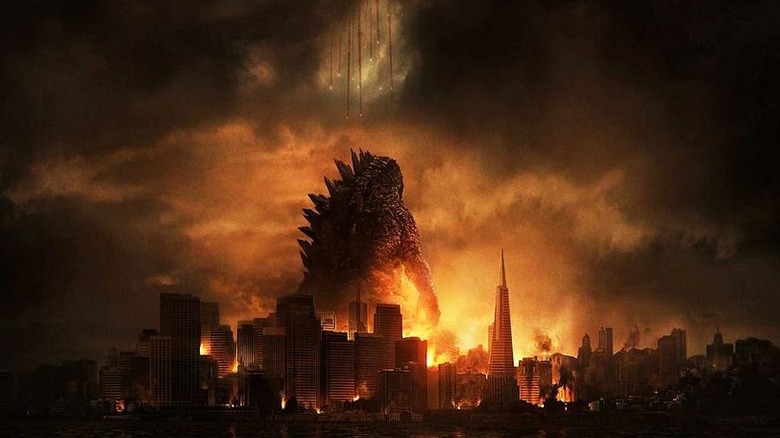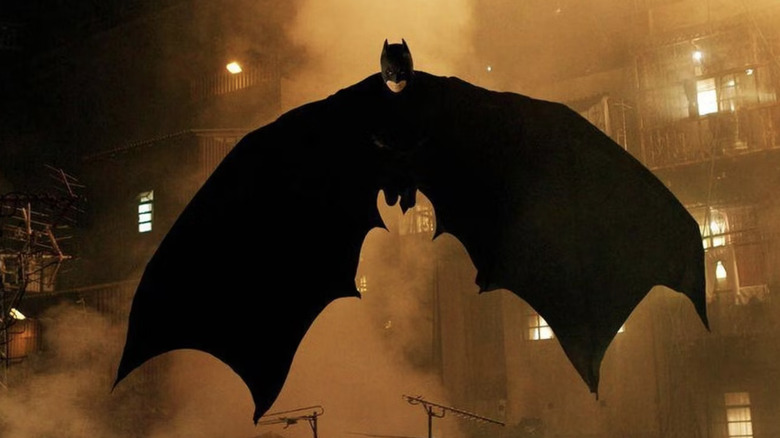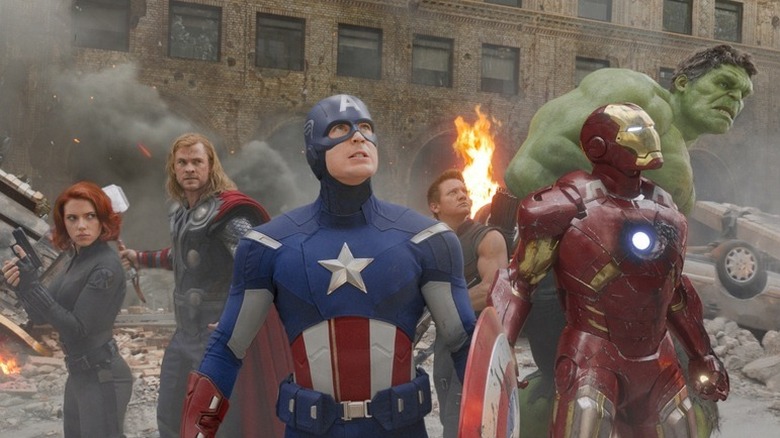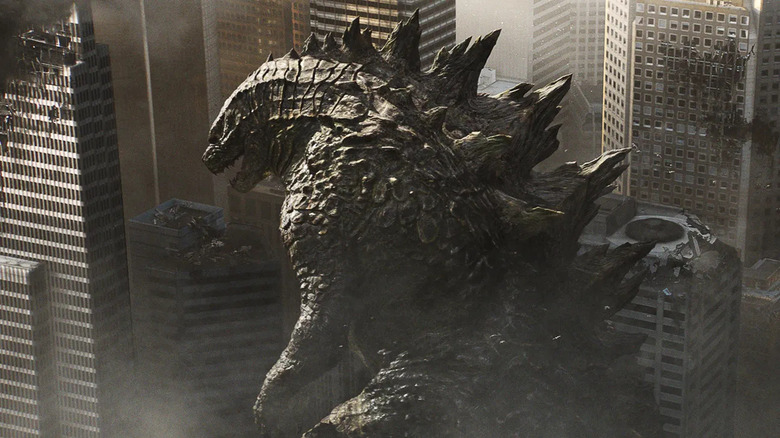How Christopher Nolan's Take On Batman Inspired Legendary's Godzilla Revamp
The so-called "MonsterVerse" is nowadays as silly as the original Toho "Godzilla" sequels became. The franchise's first entry, 2014's divisive but successful "Godzilla," looks downright anomalous. Directed with impeccable scale and craftsmanship by Gareth Edwards, the film exercises careful restraint, escalating the spectacle to make it more satisfying. The palette is made from smog and fire, i.e. what Godzilla and his monster adversaries (the MUTOs) leave in their wake. As star Elizabeth Olsen noted, the film is cut from the cloth of the original 1954 "Godzilla," where the eponymous monster is an allegory for nuclear destruction and natural disasters.
2014's "Godzilla" isn't perfect. It has a so-so script and Aaron Taylor-Johnson feels out of his depth as the lead (even if "The Fall Guy" proved he can be a movie star). Compared to the other MonsterVerse movies, though, it looks like "Jaws."
When Edwards' "Godzilla" went into production, the franchise was in a bad place. Roland Emmerich's 1998 Americanized "Godzilla" was widely panned by critics and fans, and there hadn't been a new Japanese movie since 2004's "Godzilla: Final Wars."
Legendary Pictures, partnered with Warner Bros. and Toho, assumed the unenviable task of rebooting "Godzilla." Then-CEO Thomas Tull, a fan of Godzilla since childhood, wanted to make the movie despite the risk. Speaking to the Hollywood Reporter, Tull said that he'd learned a lesson about rebooting franchises from Christopher Nolan's "The Dark Knight" trilogy. (Tull, via Legendary, was an executive producer on "The Dark Knight" and "The Dark Knight Rises," though not on "Batman Begins"). He explained:
"Everyone said that [the 'Batman'] franchise was broken, but Chris had a vision. Sometimes instead of just talking about it, you just have to do it and show folks this is our version of it."
This makes "Godzilla," and the subsequent MonsterVerse, a case study in changing Hollywood trends.
Christopher Nolan saved Batman with The Dark Knight trilogy
2005's "Batman Begins" was the most down-to-Earth "Batman" film up to that point. Nolan was not a Bat-fan and he rebuilt the character down to his essentials; he had to find out why/how Batman would be interesting to him, and in doing so, he created a way in for audiences. True to its title, the film zeroes in on how and why Bruce Wayne (Christian Bale) begins his quest for justice. Batman doesn't show up until well into the movie and the gaudiest villain costume is a burlap Scarecrow mask.
Nolan followed up "Batman Begins" with "The Dark Knight," a resounding success which remains one of the few superhero movies to become respected cinema. Nolan's movies did away with any lingering perception of Batman as silly. Sure, the comics had been moving away from silliness since Frank Miller's "The Dark Knight Returns," but most people get their Batman from the screen. Adam West's "Batman" comedy is immortal, Tim Burton's "Batman" films were Gothic but quite campy too, and they were followed by a return to the West-mean with Joel Schumacher's two "Batman" films.
After Nolan saved Batman, Hollywood thought it had the secret sauce for rebooting old IP and making audiences eat it up. All producers/directors had to do was strip away the silliness and add some "gritty realism." "Nolanize" became a verb used to describe this process, and you can see its effect on the blockbusters of this era.
How and why Hollywood moved away from gritty reboots like Batman Begins
2006's "Casino Royale" is "Batman Begins" for James Bond, while 2012's "Skyfall" is his "Dark Knight." The new "Planet of the Apes" movies (beginning in 2011 with "Rise of the Planet of the Apes") doubled down on the nihilism of the originals, and explained the origin of the ape uprising in greater (science fiction) detail, just like all the exposition about Batman's gear in the Nolan movies. 2007's "Transformers" brought its action figure characters into live-action and, despite director Michael Bay's puerile humor, depicts the robots with pure awe.
Then, in 2012, "The Avengers" became the biggest movie in the world and proved Marvel Studios' shared universe wasn't folly. So, Hollywood started chasing after that success instead of "The Dark Knight," and blockbusters became about setting up sequel after sequel. Ponderous darkness went away in favor of the quippy humor found in "The Avengers."
After all, the Marvel Cinematic Universe came with the same hook that keeps the comic's industry afloat: fans have to follow everything (and spend more money) to get the whole story in an infinite narrative. How telling that Nolan ended his trilogy with "The Dark Knight Rises" the same year that endings became verboten in superhero cinema.
Godzilla was caught between different Hollywood trends
You can see the results of this shift in the blockbusters that debuted during this timeframe. 2012's "The Amazing Spider-Man" is modeled on "Batman Begins" (for some reason, Spider-Man does all his web-slinging at night). Then, 2014's "The Amazing Spider-Man" pivots into a brighter direction with set-up for (still unmade) spin-offs.
2013's "Man of Steel" is the same. Warner Bros. wanted the same lightning to strike for Superman that had for Batman, so the studio got Nolan to produce and "The Dark Knight" trilogy screenwriter David S. Goyer to write "Man of Steel." Goyer's script apes not just the tone of "Batman Begins," but the non-chronological structure. Then Warner Bros. realized it needed a DC Cinematic Universe to compete with Marvel's, so "Batman V Superman: Dawn of Justice" it was. Legendary's "Godzilla" is the third case of this: a serious reboot followed by sequels that get ever-more sillier and reliant on crossovers.
Now, the cinematic universe trend didn't really work for anyone except Marvel and Legendary. With the latter, it helped that they only had two central characters (Godzilla and King Kong), which kept things manageable. So, what comes next, since it now looks like Marvel Studios' reign is winding down?
Based on the box office results for "Godzilla x Kong," the King of the Monsters is still going strong. As for the Dark Knight, Warner Bros.' second attempt at a DC Universe will be introducing a new Batman (not yet cast) in Andy Muschietti's "The Brave and the Bold." Will this one revitalize Batman like Nolan's films did, or like Gareth Edwards did for Godzilla? I'm unconvinced.
"Godzilla x Kong: The New Empire" is still playing in theaters and is also available to rent or buy on digital platforms.



